All major food retailers, including Aldi, have to recall food from time to time, in order to protect the public. Often, these foods pose a risk because they’re contaminated with bacteria or parasites, contain dangerous foreign objects such as metal, or have been incorrectly labeled. As a huge, international, and increasingly dominant (especially in the U.S. market) retailer, Aldi has experienced many recalls. Some, however, have been more damaging than others, due to their scope or potential impact on the public. These recalls tend to be associated with the brand for years. We’re here to take a look at the 15 worst.
Of course, many of the recalls mentioned in this article are not Aldi’s fault. More often than not, they were supplier mistakes, manufacturing mishaps, or just pure bad luck. Yet, as the retailer, it is often Aldi that is held accountable. Thankfully, Aldi is known to act swiftly when a product is suspected of being unsafe. The brand has rapid response plans that ensure all products are pulled from shelves quickly and effectively. What’s more, a product recall webpage ensures all customers can keep up to date with any recalls. As we will see, these precautions help prevent hundreds of people from falling ill.
Read more: The Most Beloved Products At Aldi, According To Shoppers
Cantaloupe Recalled Because Of Salmonella Risk

Anyone who has worked in a professional kitchen knows that raw fruit and vegetables are high risk foods. This is because they can harbor germs and bacteria such as Salmonella, E. coli, and Listeria. These risks are also present in the retail setting, as retailers like Aldi are only too aware of.
In November 2023, Aldi recalled three different raw fruit products: cantaloupe, cantaloupe chunks, and pineapple spears. Each of these foods was linked with an outbreak of Salmonella that infected over 100 people across 32 states. A total of 45 people were hospitalized due to the infection.
Not all of the infections were associated with fruit sold by Aldi. In fact, only cases in Illinois, Indiana, Iowa, Kentucky, Michigan, and Wisconsin were found to be linked with Aldi’s products. Several other retailers also sold cantaloupe carrying Salmonella that made people sick, suggesting large quantities of the fruit were contaminated at some point during the growing or processing phases, well before they were distributed to retailers across the country.
Cream Cheese Recalled Over Salmonella Concerns


In May 2024, Schreiber Foods announced that several products containing its cream cheese were being recalled due to fears they contained Salmonella. As a retailer that uses cream cheese from Schreiber Foods, Aldi also issued a recall. This recall focused on four Happy Farms cream cheese spread products: Whipped Cream Cheese Spread, Chive & Onion Cream Cheese Spread, Cream Cheese Spread, and Strawberry Cream Cheese Spread. Other grocery store brands, including Hy-Vee, issued recalls of their own.
Despite these recalls, covering stores in over 25 states, there have yet to be any reports of illness associated with Schreiber Foods’ cream cheese. That being said, Aldi and Schreiber Foods aren’t out the woods just yet; the majority of recalled products have sell-by-dates that stretch into September 2024, meaning there remains plenty of time for members of the public to fall foul of this contaminated product.
Chocolate Recalled Due To Undeclared Allergen
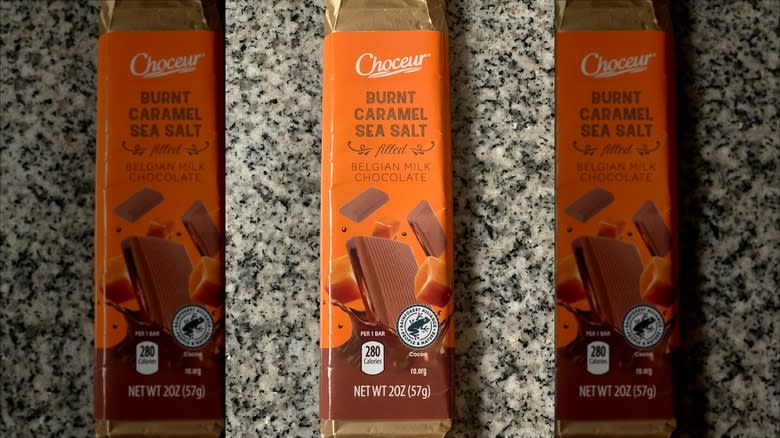

All food products sold in stores must have adequate and complete labeling. Among the most important aspects of a product’s label is its allergen information. This list of ingredients allows those with allergies to ascertain whether a food is safe for them to consume or not. Incorrect allergen information obviously poses a huge risk, as consumers might unknowingly consume something that could trigger a reaction and, in the worst cases, anaphylaxis.
In December 2023, it was announced that Astor Chocolate Corporation was recalling 1,092 chocolate bars as the label failed to list coconut as a potential allergen. All of these chocolate bars were sold in Aldi stores across Florida. The potential consequences of this mislabeling were massive; customers could have become seriously or even fatally ill. Fortunately, no illnesses or hospitalizations were recorded as a result of the mislabeling and the recall was performed successfully.
Stone Fruit Recalled Due To Listeria


Listeria is a bacteria that causes an infection known as listeriosis. While rarely serious, listeriosis can make pregnant people, newborn children, fetuses, and those with weakened immune systems seriously ill. HMC Farms, a fruit producer based in California, caused a Listeria outbreak that lasted from August 2018 to August 2023 by selling contaminated peaches, plums, and nectarines to a variety of retail brands. Aldi was one of them. In November 2023, Aldi announced a recall on peaches, plums, and nectarines sold during the summer of 2021 and 2022. These recalls were issued across 29 states. Over the entire outbreak, it is thought that 10 people were hospitalized, one person died, and one person was forced into pre-term labor due to illness caused by the fruit. It is not known which, if any, of these people bought the contaminated fruit from Aldi.
It may seem strange to issue a recall for fruit so long after it was sold. However, retailers including Aldi did so just in case customers had frozen the fruit; freezing does not kill Listeria. Another reason why the recall was issued so late was because the Food and Drug Administration first tested the suspect fruit November 2023.
Frozen Strawberries Recalled Over Hepatitis A
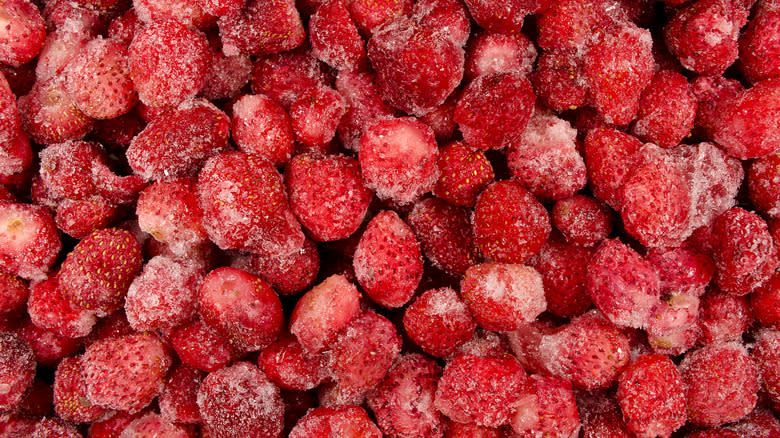

Hepatitis A is an illness caused by the Hepatitis A virus. It causes inflammation of the liver and is primarily spread when the feces of a person with Hepatitis A is ingested by someone who has never contracted the virus. As such, it is often linked with poor sanitation. While most people recover quickly, Hepatitis A can cause acute liver failure. As a result, the virus is taken very seriously.
In 2023, the Scenic Fruit Company voluntarily recalled its frozen strawberries as they were found to be contaminated with the Hepatitis A virus. Retailers who carried the contaminated strawberries, including Aldi and Costco, quickly followed suit. Aldi recalled Simply Nature Organic Strawberries from stores across 12 states.
It was reported that five people contracted Hepatitis A as a result of eating Scenic Fruit Company’s frozen strawberries, although it is not known from which grocery store these products were bought. Two of these people required hospitalization. There are concerns that some customers may still have the product, as some of the frozen strawberries have a best-by date that stretches into November 2024, which may cause the number of hospitalizations associated with the product to rise.
Pet Advent Calendar Recalled Over Choking Hazard


It’s not just humans that food products pose a risk to, but animals too. This was highlighted in December 2021 when Aldi was forced to recall two advent calendars that had been designed for dogs and cats by Pet Brands Products, a company based in Ohio. Customers complained that the treats included in the advent calendar were small and extremely hard and thus posed a choking risk to the animals they were fed to.
One pet owner wrote on Reddit, “I noticed that the treats were way harder than last year. My dog can swallow them whole without a real problem but he’s a large lab so he’s pretty big. I can see it being an issue with smaller pets.” Several others noted that the treats had made their animals choke or vomit. Fortunately, there were no reports of animals becoming fatally ill after ingesting the treats.
Metal Contaminants Led To Chicken Recall


Tyson Foods is one of the largest food companies in the United States, and its products are sold by many of the nation’s leading retailers. This is why it was such a huge deal when, in 2019, Tyson Foods announced that metal had been found in some of its chicken strips. A mass effort subsequently took place to recall 11.8 million pounds of chicken.
Aldi is one of many grocery store brands that sells Tyson Foods products. As a result, it was forced to recall both its Kirkwood Buffalo Crispy Chicken Strips and Kirkwood Honey BBQ Crispy Chicken Strips. The former was recalled from stores across 29 states, the latter from stores across 32 states.
Happily, only six people reported finding metal in Tyson Foods’ chicken strips; a minor miracle, given that so many grocery store brands were stocking the tainted product. Of these people, three sustained injuries to their mouths.
Various Beef Products Were Recalled Over A Horsemeat Scandal
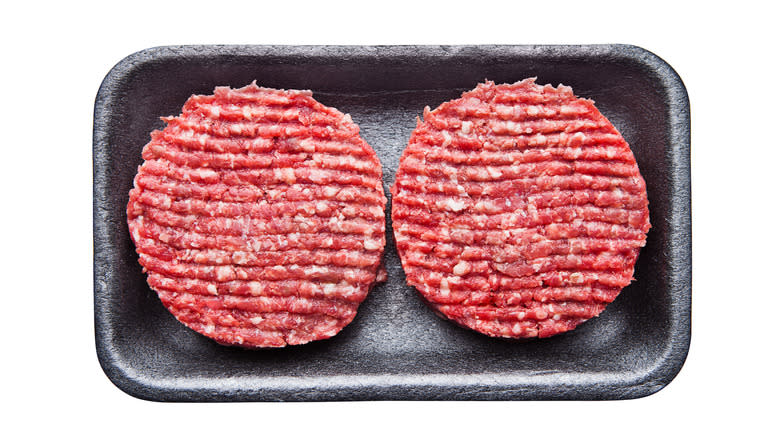

The most damaging of all food recalls suffered by Aldi was undoubtedly the so-called horse meat scandal that rocked Europe in 2013. It was discovered that beef products sold by a range of grocery store brands across Europe contained horse in place of beef.
In Aldi’s case, horse meat of varying levels was found in two products: a frozen lasagna and a spaghetti Bolognese. Some of these products were found to contain 100% horse meat. All were removed from the shelves. While having no ill effects on health, this scandal led many people’s trust of large grocery stores and certain foods they sell to drop.
At the time of the scandal, a spokesman for Aldi told The Guardian, “This is completely unacceptable and like other affected companies, we feel angry and let down by our supplier. If the label says beef, our customers expect it to be beef. Suppliers are absolutely clear that they are required to meet our stringent specifications and that we do not tolerate any failure to do so.”
Frozen Falafel Recalled Over E. Coli Concerns
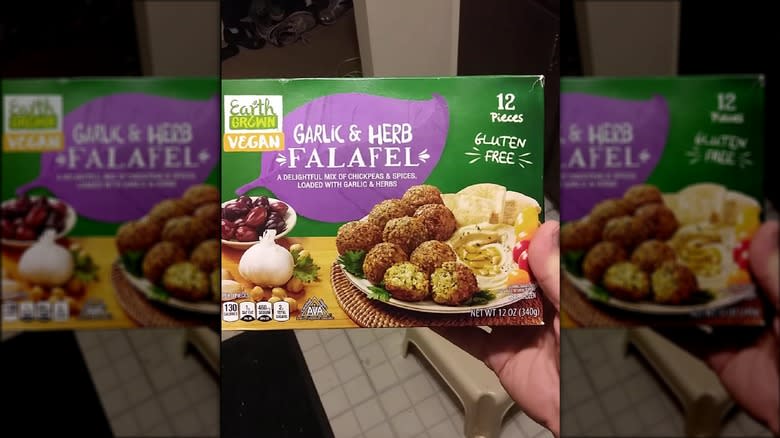

In October 2022, Aldi recalled two frozen falafel products produced by Cuisine Innovations Unlimited. The products, which were sold under Aldi’s Earth Grown brand, had been contaminated with E. coli bacteria. These falafel posed a serious health risk and were responsible for 24 people falling ill. Five individuals required hospitalization. No deaths were reported, although one individual did develop hemolytic uremic syndrome, an illness which can lead to mass blood clotting.
Freezing does not kill E. coli, hence why the bacteria is prevalent in globalized food chains where many products are shipped frozen. However, temperatures of 160 degrees Fahrenheit do kill the bacteria. It can therefore be hypothesized that many members of the public bought and ingested the E. coli-tainted Earth Grown falafel but avoided becoming ill because they cooked the dish to the requisite temperature. Of course, the fault still lies with Cuisine Innovations Unlimited for producing and selling an unsafe food.
Salad Dressing Recalled Due To Manufacturing Error
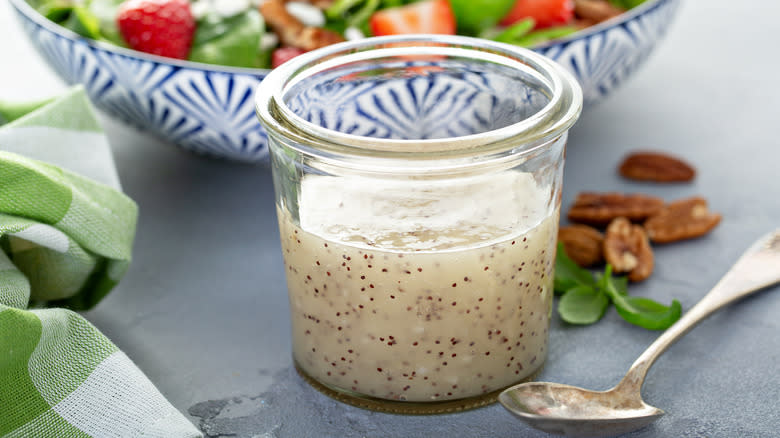

Most store-bought salad dressings and vinaigrettes are manufactured in a way that maximizes shelf life and inhibits the growth of bacteria. One way this is achieved is by ensuring the product has an acidic or alkaline pH, as many potentially harmful bacteria do not grow well in these conditions.
In 2021, Aldi and Drew’s Organics raised a joint recall of Aldi’s Simply Nature Organic Poppy Seed Dressing after it was discovered that the dressing was a different color than usual. Further investigation revealed that a manufacturing error had led to the dressing attaining the wrong pH. Both companies were concerned that this pH would allow potentially harmful bacteria to grow in the product, including Clostridium botulinum, the bacteria responsible for botulism.
The affected bottles of Simply Nature Organic Poppy Seed Dressing were sold in Aldi stores across 30 states. Thankfully, no illnesses were reported as a result of the incorrectly manufactured salad dressing and the recall was successfully executed.
Flour Recalled Due To E. Coli Concerns


In 2019, Aldi recalled 5 pound bags of Bakers Corner All Purpose Flour over concerns that it was contaminated with E. coli bacteria. The recall was in effect across 11 states. This outbreak was traced back to Aldi’s supplier ADM Milling Co. As a result, several customers of ADM Milling Co. including King Arthur Flour and Pillsbury Best Bread Flour, also recalled their products.
Across the entire outbreak, 17 people were recorded as falling ill and three were hospitalized. Given that E. coli bacteria are killed at 160 degrees Fahrenheit, the prevalence of these illnesses might seem confusing. However, an investigation by the Centers for Disease Control and Prevention revealed that several of those afflicted with E. coli had tasted raw batter or dough when they were baking. Those who only ate the batter after it was sufficiently baked would not have suffered from an E. coli infection. It’s for this reason that scientists often tell the public to avoid eating uncooked flour.
Bagged Salad Recalled After It Was Found To Contain Parasites
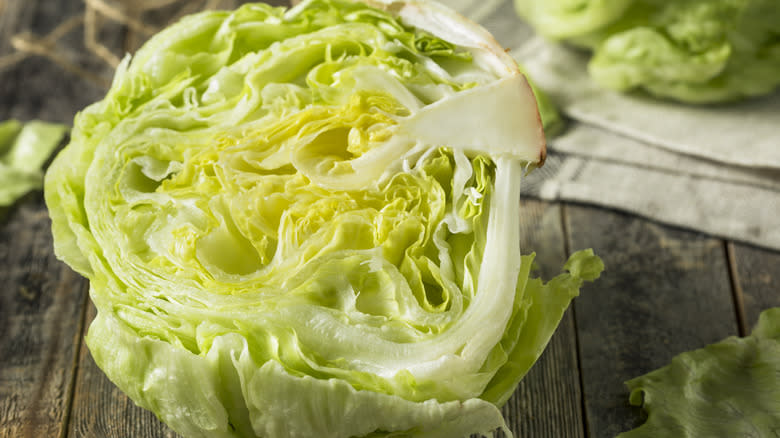

Few things make people cringe as much as the idea of contracting a parasite. Unfortunately for some 700 Americans this was a reality they had to face after eating contaminated salad produced by Fresh Express. As a major supplier, Fresh Express’ contaminated foods — including iceberg lettuce, red cabbage, and carrots — ended up in bagged salad products sold by a host of major retailers, including Aldi, Hy-Vee, and Walmart.
These products contained Cyclospora cayetanensis, a parasite that causes an intestinal illness known as cyclosporiasis. Symptoms of this illness include fatigue, nausea, and diarrhea. Over 700 cases of cyclosporiasis were recorded as a result of this outbreak. 38 people had to be hospitalized.
In response to the outbreak, Aldi recalled Little Salad Bar Garden Salad and removed the product from its shelves. Thankfully, as a perishable product, there was little risk of customers consuming the contaminated product in the weeks following the initial outbreak.
Ground Chuck Beef Recalled Over E. Coli
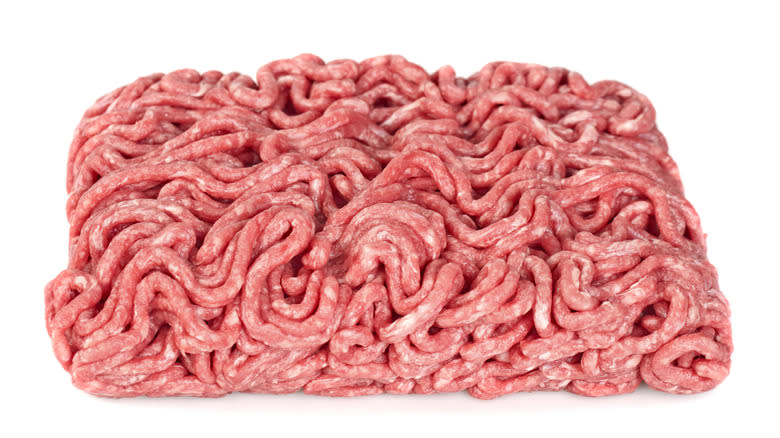

Cargill is a huge food business that supplies a vast range of grocery store brands. This means that when the company’s food becomes contaminated at source, it has a huge impact on the United States’ food industry. This was the case in 2018 when Cargill was forced to recall over 132,000 pounds of ground beef due to concerns it was contaminated with E. coli. Major retailers including Sam’s Club and Target immediately pulled ground beef products from the shelves. Aldi did the same, recalling both an 80% lean ground beef product and its 80% lean beef patties from stores across 11 states.
Despite the quick actions of all grocery store brands involved, the E. coli outbreak resulted in 17 people falling ill, one of whom developed hemolytic uremic syndrome. It is thought that six people required medical attention. Unfortunately, one individual passed away as a result of eating Cargill’s tainted meat.
Canned Spinach Recalled After Mislabelling
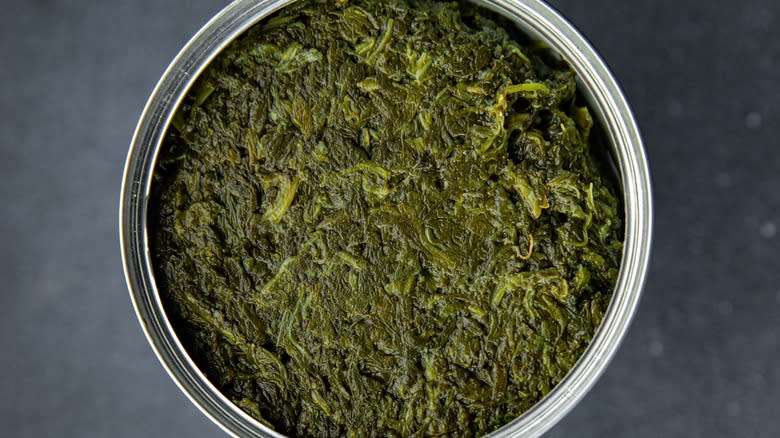

According to a study published in The Journal of Allergy and Clinical Immunology, around 1.8% of the United States’ population suffers from a peanut allergy. This is a significant amount, especially as those with peanut allergies may suffer from severe reactions, including anaphylaxis, if exposed to the food.
As a rule, most people suffering from peanut allergies practice strict avoidance of these legumes. They are aided in this process by clear labels that list a product’s allergens. Unfortunately, during 2018, some cases of Happy Harvest Canned Spinach, which is produced by McCall Farms, failed to list peanuts as a potential allergen due to a labeling fault.
The product, which is only sold in Aldi, was immediately recalled from stores in 16 states. Thankfully, no illnesses or reactions were reported as a result of this mislabeling — a great relief considering the potentially fatal consequences the error could have had.
Kielbasa Recalled Over Bone Fragments
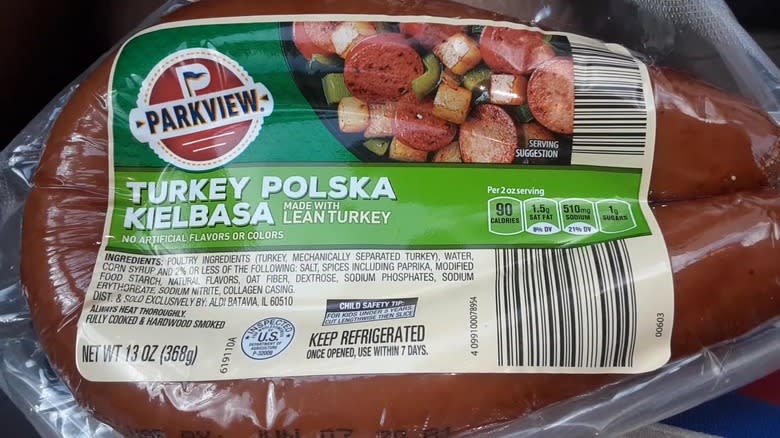

In January 2024, Salm Partners announced that one of its turkey kielbasa products had been found to contain small shards of bone. In partnership with Aldi, the company recalled over 133,000 pounds of the product from Aldi stores across more than 30 states. Despite this, several complaints were lodged by customers who had purchased and started eating the product. One person even suffered a minor injury to their mouth as a result of eating the kielbasa.
Salm Partners issued another recall in March 2024 for a further 35,000 pounds of turkey kielbasa that was distributed by Safeway. This batch was found to be contaminated with small pieces of rubber. No injuries or illnesses were reported as a result of the rubber tainted sausages although two recalls for the same product in such quick succession raised some serious questions about the Salm Partners’ manufacturing processes.
Read the original article on Daily Meal
Source Agencies


